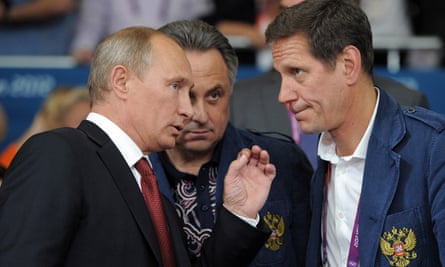Fifa’s ethics committee is to examine the World Anti-Doping Agency report into drug misuse in Russian athletics for potential misconduct by the country’s sports minister, Vitaly Mutko, a Fifa executive committee member who was heavily criticised at the report’s launch.
Dick Pound, the former Wada president who chaired the independent commission which found a huge “state sponsored doping programme” in Russia, accused Mutko at the report’s launch of having been “aware” and “complicit” in the doping and its cover-up. Compounding the difficulty for Fifa of the report’s devastating findings of government-sanctioned doping within the country hosting the 2018 World Cup, Mutko is the chairman of the committee organising the tournament.
A spokesman for Fifa’s ethics committee reacted to the publication of the Wada commission’s findings by promising, “We will carefully analyse the findings of the report.” Fifa’s code of ethics, principally aimed at prohibiting financial corruption, discrimination and harassment, includes a duty to “show commitment to an ethical attitude”. The Wada independent commission met Mutko “to provide him with an opportunity to help in its investigation” at the Hotel Baur au Lac in Zurich on 22 September, when Mutko was attending Fifa meetings relating to the hosting of the 2018 World Cup.
Pound’s conclusion, expressed in introducing the report on Monday, was that Mutko, the Russian sports minister throughout the period in which doping is alleged,, and a Fifa executive committee member since 2009, must have known of the systematic doping of athletes and was in effect party to its cover-up. “It was impossible for him not to be aware of it,” Pound said. “And if he’s aware of it, he’s complicit in it.”
The report to Wada devoted a section to the stance of Mutko’s ministry of sport, Minsport, to the allegedly widespread doping of athletes to support that conclusion. The commission said it had “serious doubts” about whether the Russian anti-doping agency, Rusada, which was accused of protecting rather than exposing the doping of athletes, was truly independent of the sports ministry. Mutko’s ministry, the report found, “did nothing to investigate the serious allegations of criminal conduct on the part of Russian sport officials”.

After the investigation by the German broadcaster ARD, which featured whistleblowers recording incidences of doping within Russian athletics, the commission found that Rusada conducted its own investigation. “It is inexplicable that Minsport would allow Rusada, as the subject of several of the allegations in the ARD documentary, to investigate itself,” the report said. At the meeting in Zurich, the commission recorded, Mutko denied wrongdoing and said his ministry provides funding “to build up the best laboratories and the best methods of testing athletes in the interests of clean sport”.
However the commission also said of Mutko’s attitude: “He is disgusted with the whistleblowers, does not believe their allegations and says they had no right to make the recordings and that such tapings [sic] are matters for the public prosecutors.” He described its disclosures on Monday as “baseless”.
Mutko’s ministry also gave contradictory accounts of its actions following the ARD documentary, according to the commission’s report. Natalia Zhelanova, Mutko’s adviser and former head of anti-doping in Minsport, told the commission that an investigation had been conducted and a report is expected by the end of the year. “Another version,” the commission said, was that all the athletes implicated had been interviewed, denied any complicity, and the matter had been dropped in Russia. Mutko, however, gave the commission a third version, which was that “investigations had occurred and that certain people had been fired”.